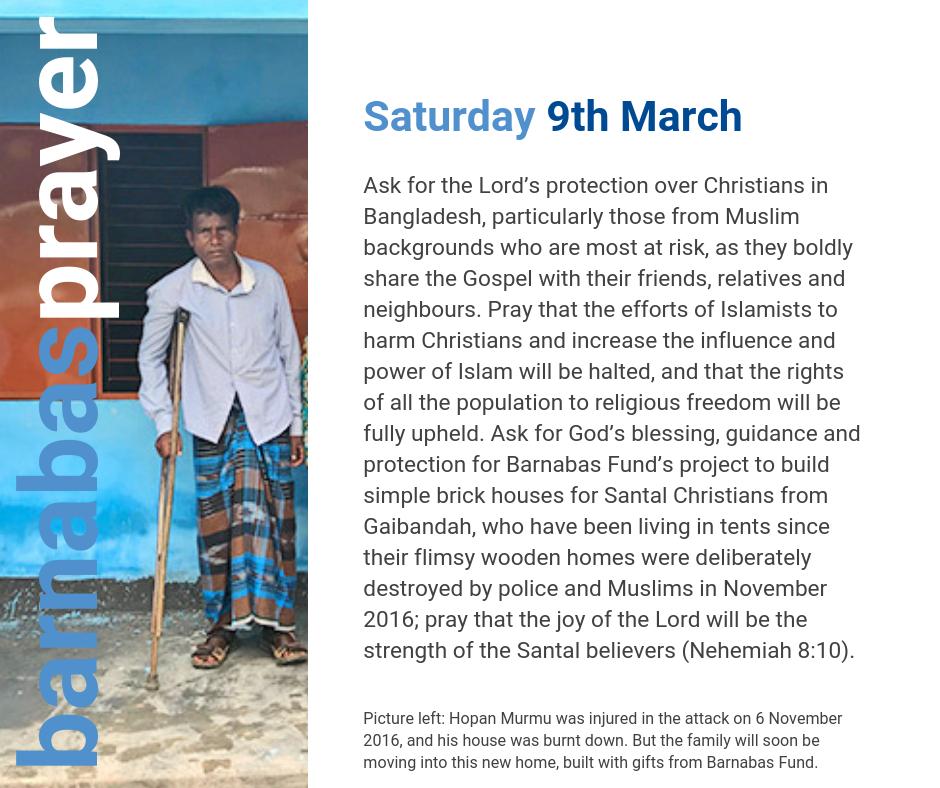This morning at the Reader Training Day School, Matt Frost who is in his second year of training led a thought-provoking service of prayer for persecuted Christians.
As you might expect the main focus was on Christians persecuted around the world and especially in highlighted trouble-spots. Matt concluded with a reading from a Tweet he received earlier from the @BarnabusFund
His service sheet is below followed by my reflection and thoughts which went a little wider as my brain began to wander through the subject.
A Service of Prayer for Persecuted Christians
GREETING
The grace of our Lord Jesus Christ be with you. And also with you.
(from Isaiah 49) Sing for joy, O heavens, and exult, O earth; break forth, O mountains, into singing!
For the Lord has comforted his people, and will have compassion on his suffering ones
INVITATION TO PRAYER
Let us pray for the persecuted church, for their oppressors, for nations that foster persecution, and for those who ignore it.
Let us read the Holy Scriptures, finding there the stories and witness of hope borne by those who lived through ordeals to the glory of God, and hear the promises of the gospel for all who are persecuted for righteousness’ sake.
In our prayer for persecuted Christians, let us not narrow our compassion for all who suffer, whatever their profession or creed; let no hatred or prejudice enter our hearts for anyone.
Called by the Holy Spirit to unity with the persecuted, let us enter into their suffering, repenting of our ignorance, refusing to be silent, ready to reach out to them in their isolation.
SCRIPTURE READINGS
READING 1. Nothing Can Separate Us From God’s Love: Romans 8:31-39
Reader: We also recognise all the martyrs and persecuted Christians who have gone before us. Hear the account of the persecution and martyrdom the young woman Perpetua.
A violent persecution being set on foot by the emperor Severus, in 202 {AD}, it reached Africa the following year; when, by order of Minutius Timinianus, (or Firminianus,) five catechumens {new Christians being instructed in preparation for baptism} were apprehended {and jailed} at Carthage for the faith: {among them} Felicitas and Vibia Perpetua. Felicitas was seven months {pregnant}; and Perpetua had an infant at her breast, was of a good family, twenty-two years of age, and married to a person of quality in the city. The father of Perpetua, who was a pagan, {wanted her to offer sacrifice to “the well-being of the emperor.”} Perpetua, before her death, wrote: “We were in the hands of our persecutors, when my father, out of the affection he bore me, made new efforts to shake my resolution. I said to him: ‘Can that vessel, which you see, change its name?’ He said: ‘No.’ I replied: ‘Nor can I call myself any other than I am, that is to say, a Christian.'”
Perpetua and Felicitas and the others refused to offer sacrifice and they willingly accepted death in the amphitheater at the hands of gladiators and wild animals.
READING 2: A Vision of the Martyrs Blessing God Who Has Saved Them: Revelation 7:9-12
Reader: Listen to early Christian writers who mused on the meaning and significance of the suffering and martyrdom of their brothers and sisters.
Tertullian, a second-century lawyer who converted when he saw Christians singing as they went out to die, exclaimed, “The blood of the martyrs is seed. Their blood is the seed of new Christians, the seed of the church.”
The third-century bishop Cyprian said, “When persecution comes, God’s soldiers are put to the test, and heaven is open to martyrs. We have not enlisted in an army to think of peace and to decline battle, for we see that the Lord has taken first place in the conflict.”
Augustine wrote, “The martyrs were bound, jailed, scourged, racked, burned, rent, butchered and they multiplied!”
READING 3. The Beatitudes: Matthew 5:1-12
Reader: the daily prayer request from Barnabas Trust or other source.
We recognise that today who suffer for their faith and wish to stand with them and remember them in our prayers. EXCHANGE PRAYER FOR ICHTHYS FISH SYMBOL.
Final prayer:
Faithful One, you call us to pray for our brothers and sisters, who are part of the Church body that is under persecution. Humbly, we confess that we don? know how to pray for them. Lead us, Gracious Spirit, and we will follow. Holy and Just God, we call forth your light for those shut away in darkness for being called your disciples. We seek your strength for those weary with suffering because they name you as Lord. We ask courage for all who stand in danger due to their faith. And we pray comfort, Holy Spirit, for those who grieve the death of loved ones whose beliefs sent them to their graves. O God, as we cry out on their behalf, we stand with them in their suffering. We remember their pain. May they know they are not forgotten. We hold them now in silence before you.
(silence)
In the name of Jesus we pray.
Amen.
FINAL BLESSING
Marked with the sign of the cross in baptism we accept the freedom and power God gives to resist evil, injustice and oppression in whatever forms they present themselves. We go forth in the freedom and power of the Holy Spirit to resist the evil and injustice inflicted on others, especially sisters and brothers in Christ. We pray for them. In one another’s company we find ways to act in love toward them. We are sent in Christ’s name.
The grace of the Lord Jesus Christ, the love of God, and the communion of the Holy Spirit be with us now and always.
Amen.

As we were reminded of the story of Felicitas and Vibia, the two well-to-do young women martyred at the hands of gladiators and wild animals for the entertainment of the populace I asked myself, “What would I do?” and “Would I be in denial like Peter at the fire – three times before the cock crowed?”
Probably I would side with self-preservation and would find myself a wonderful set of excuses as to why preserving my safety would be in the wider interests of the bigger picture or something of that nature. But then I have never been in that situation.
I find it really difficult to really imagine those extremes.
In Church, of course, Christians do not persecute each other…….. Well they shouldn’t but safeguarding events tell us different story. Did you know that the diocese deals with dozens of safeguarding queries every month of different levels of severity?
At its lowest level it is about the transfer of power – someone making themselves feel better by making someone else feel worse. That needs exploring in a church context…
Hypothetical situations – not meant to refer to any real persons or situations:
- The church warden, or wardens who ferment discontent among a congregation against someone else- perhaps the reader, the incumbent or a PCC member who might make a potential church warden in the future and therefore pose a threat. Visiting priests who have volunteered to cover a service can be excellent targets with the seeming end of their decision never to go back.
- The incumbent who has a particular axe to grind, whether personal or theological and blocks someone else’s vocation by belittling them. This might be belittling the training they might do, belittling their skills, ability to learn or usefulness.
- The person in the congregation who ‘through love’ takes it upon themselves to correct what they think is the inappropriate behaviour of someone else. I am sure you can think of many examples of this but it might be to do with relationships, sexuality, the Bible version they use, their lack of volunteering to clean the brass and so on.
- The teenager who ‘comes out’ as gay or lesbian and is either hounded out of the church, put through ‘conversion therapy’ but certainly has it made known that they are a sinner and ‘in love’ -of course are rejected.
- Those who cannot or refuse to appreciate that the Church of England is a wide church with a broad theological base and members are on a wide spectrum with extremes of churchmanship at both ends. Sometimes this can lead to folk feeling hugely troubled because they don’t put the candles in the right place, stand up at the wrong time, lift their hands, don’t lift their hands, pass the peace with a huge hug or cower at the end of a pew and so on.
- I’m sure readers who get this far in my meanderings can think of many more examples of their own.
And all those are outside the main topics of safeguarding that we talk about in courses!
Matt’s focus on the persecution of Christians around the world is something we need to keep in our thoughts and our prayers. Equally we must pray for Christians persecuted by ‘Christians’ or one branch of Islam persecuted by another, and indeed persecution of all people of faith whether Jew or Hindu, Sikh or buddhist.
Just perhaps we should focus a little more on love and acceptance and let God take care of the judging!
